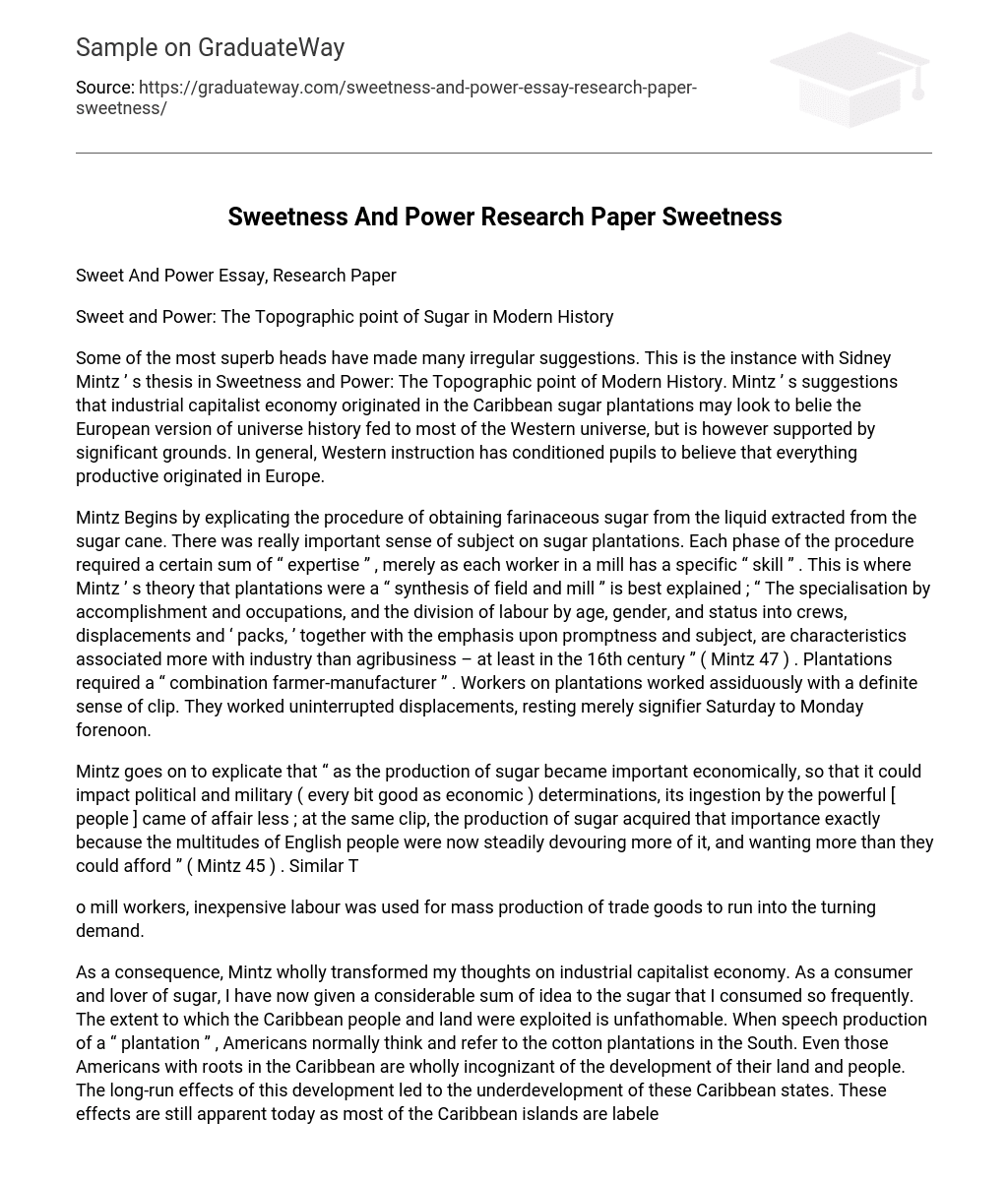Some of the most superb heads have made many irregular suggestions. This is the instance with Sidney Mintz ’ s thesis in Sweetness and Power: The Topographic point of Modern History. Mintz ’ s suggestions that industrial capitalist economy originated in the Caribbean sugar plantations may look to belie the European version of universe history fed to most of the Western universe, but is however supported by significant grounds. In general, Western instruction has conditioned pupils to believe that everything productive originated in Europe.
Mintz Begins by explicating the procedure of obtaining farinaceous sugar from the liquid extracted from the sugar cane. There was really important sense of subject on sugar plantations. Each phase of the procedure required a certain sum of “ expertise ” , merely as each worker in a mill has a specific “ skill ” . This is where Mintz ’ s theory that plantations were a “ synthesis of field and mill ” is best explained ; “ The specialisation by accomplishment and occupations, and the division of labour by age, gender, and status into crews, displacements and ‘ packs, ’ together with the emphasis upon promptness and subject, are characteristics associated more with industry than agribusiness – at least in the 16th century ” . Plantations required a “ combination farmer-manufacturer ” . Workers on plantations worked assiduously with a definite sense of clip. They worked uninterrupted displacements, resting merely signifier Saturday to Monday forenoon.
Mintz goes on to explicate that “ as the production of sugar became important economically, so that it could impact political and military ( every bit good as economic ) determinations, its ingestion by the powerful [ people ] came of affair less ; at the same clip, the production of sugar acquired that importance exactly because the multitudes of English people were now steadily devouring more of it, and wanting more than they could afford ”. Similar To mill workers, inexpensive labour was used for mass production of trade goods to run into the turning demand.
As a consequence, Mintz wholly transformed my thoughts on industrial capitalist economy. As a consumer and lover of sugar, I have now given a considerable sum of idea to the sugar that I consumed so frequently. The extent to which the Caribbean people and land were exploited is unfathomable. When speech production of a “ plantation ” , Americans normally think and refer to the cotton plantations in the South. Even those Americans with roots in the Caribbean are wholly incognizant of the development of their land and people. The long-run effects of this development led to the underdevelopment of these Caribbean states. These effects are still apparent today as most of the Caribbean islands are labeled as “ Third World Countries ” .
In add-on, Mintz mentions the separation of the production from ingestion. The Major consumers of sugar were non the difficult workers on the plantation, but the far removed citizens of England. The plantation workers were non able to gain from the fruit of their land. They were forced to work under rough conditions. Even after bondage ended, the workers were over-worked and under-appreciated merely as factory workers were in the documented and “ established ” industrial societies Americans have been trained to visualise.
Industrial capitalist economy involves an organisation affecting ownership, control and way of production. This was what took topographic point on sugar plantations in the Caribbean. Every worker had set responsibilities and a incorporate end of mass production of sugar at the most efficient rate. Mintz does an first-class occupation of beliing the European version of universe history fed to most of the Western universe by turn outing that industrial capitalist economy originated in the Caribbean sugar plantations.
Bibliography
Work Cited
Mintz, Sidney. 1985. Sweet and Power: The Topographic point of Sugar in Modern History.
New York: Viking Penguin.





